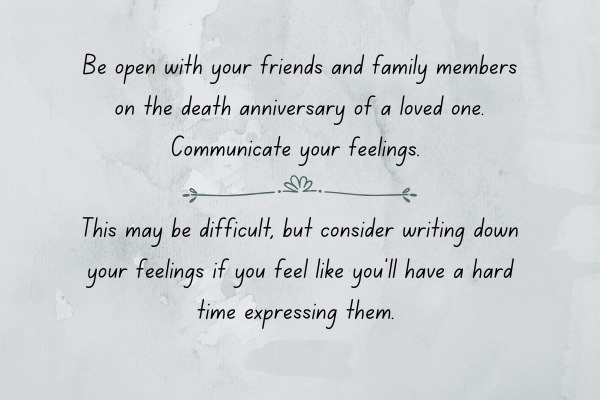Losing a loved one is one of life’s most challenging experiences. While the pain of loss may diminish over time, it never fully disappears. Instead, it manifests in different ways and becomes a part of who we are. One of the ways that we remember and honor our loved ones who have passed away is by observing their death anniversary. It’s a time to reflect, to grieve, and to celebrate the life of someone who we loved deeply. However, knowing what to say (and not to say) on a death anniversary can be challenging. In this article, we’ll explore some tips on how to communicate with empathy and support those who are grieving on this difficult day.
Table of Contents
The Importance of Acknowledging a Death Anniversary
Acknowledging a death anniversary is an important part of the grieving process. It allows us to remember and honor our loved ones who have passed away, and to keep their memories alive. For many people, a death anniversary can be a difficult day, filled with sadness and emotions. By acknowledging this day, we can show our support and love for those who are grieving.
Moreover, acknowledging a death anniversary can help us come to terms with our own feelings of loss and grief. It can provide an opportunity to reflect on the impact that our loved ones had on our lives and the world around us. By doing so, we can find comfort and meaning in their memory and move forward with a renewed sense of purpose.
In addition, observing a death anniversary can be a way to connect with others who are also grieving. It can be a time to share stories and memories, to offer and receive support, and to feel a sense of community with others who understand our pain. By acknowledging a death anniversary, we can demonstrate our compassion and empathy for those who are struggling with loss, and help them feel less alone in their grief.
Words of Comfort to Offer on a Death Anniversary
When reaching out to someone who is grieving on a death anniversary, it’s important to offer words of comfort and support. Here are some phrases that can be helpful:
- “I’m thinking of you today.” – This simple statement lets the person know that you are aware of the significance of the day and that you care about their well-being.
- “I remember when [loved one’s name] and I [shared memory].” – Sharing a positive memory of the loved one can help the person feel connected to their memory and provide comfort.
- “I’m here for you if you need anything.” – Letting the person know that you are available to help in any way can be a source of comfort.
- “I can’t imagine how hard today must be for you.” – Acknowledging the difficulty of the day and the person’s feelings validates their experience and shows empathy.
- “I’m sending you love and support.” – Letting the person know that they are not alone and that you are holding them in your thoughts can be a source of comfort.
It’s important to remember that everyone grieves differently, and some may not want to talk about the loss on the anniversary. It’s essential to respect their wishes and provide support in other ways if needed.
What Not to Say on a Death Anniversary
While it’s essential to offer words of comfort and support, there are also things to avoid saying on a death anniversary. Here are some phrases that may not be helpful:
- “It’s time to move on.” – This statement can invalidate the person’s feelings and make them feel like their grief is not important.
- “I know how you feel.” – While it may come from a good place, it’s impossible to truly know how someone else is feeling, and it can feel dismissive or invalidating.
- “At least they’re in a better place.” – While this may be a comforting belief for some, it may not be helpful for everyone. It’s essential to acknowledge and respect each person’s beliefs and feelings.
- “They wouldn’t want you to be sad.” – This statement can put pressure on the person to “get over” their grief, and it may not be true. Everyone grieves differently, and it’s okay to feel sad and miss the person who has passed away.
- “Let me know if you need anything.” – While this statement comes from a good place, it can put the burden on the person who is grieving to reach out for help. Instead, offer specific ways you can help or support them.
Remember, the most important thing is to listen and be present with the person who is grieving. Avoid trying to fix or minimize their feelings and instead offer comfort and support in a way that feels appropriate for them.
The Role of Empathy in Communication
Empathy is a crucial component of effective communication, especially when it comes to supporting someone who is grieving. Empathy is the ability to understand and share the feelings of another person, and it can be an incredibly powerful tool in helping someone feel heard and validated.
When communicating with someone who is grieving on a death anniversary, empathy can help you connect with them on a deeper level. It can help you understand their emotions and provide comfort in a way that feels genuine and authentic.
One way to demonstrate empathy is to actively listen to what the person is saying. Listen not just to the words they are saying, but also to the emotions behind them. Pay attention to their body language, tone of voice, and facial expressions. By doing so, you can show that you are fully present and engaged in the conversation.
Another way to show empathy is to validate their feelings. Let them know that their emotions are understandable and normal. Avoid minimizing or dismissing their feelings, as this can be hurtful and invalidating. Instead, offer words of comfort and understanding.
Empathy can also help you avoid saying something that may unintentionally cause more pain. By putting yourself in the other person’s shoes, you can consider how your words may be received and adjust your communication accordingly.
Overall, empathy is an essential part of effective communication, and it can be especially helpful in supporting someone who is grieving on a death anniversary. It can help you connect with the person on a deeper level, validate their emotions, and provide comfort in a way that feels genuine and authentic.
The Power of Listening and Being Present
When supporting someone who is grieving on a death anniversary, listening and being present can be incredibly powerful. It shows that you care, that you are there for them, and that you are willing to hold space for their emotions.
One of the most important things you can do when listening to someone who is grieving is to give them your undivided attention. This means putting away your phone, turning off the TV, and eliminating any other distractions. By doing so, you are sending a message that you value their feelings and that they have your full attention.
It’s also important to listen actively. This means paying attention to what the person is saying, asking clarifying questions, and reflecting back what you’ve heard. This can help the person feel heard and validated, and it can help you better understand their perspective.
Another important aspect of being present is being aware of your own emotions. It can be challenging to sit with someone who is in pain, and you may feel a range of emotions, from sadness to discomfort. It’s essential to recognize these emotions and allow yourself to feel them, while also being mindful not to let them interfere with your ability to listen and support the person who is grieving.
Being present can also mean being physically present. If possible, consider offering to spend time with the person on the anniversary of their loved one’s death. You could offer to go for a walk, watch a movie together, or simply sit and talk. Being physically present can be a source of comfort, and it can help the person feel less alone.
Overall, the power of listening and being present cannot be overstated. It can be an incredibly powerful way to support someone who is grieving, and it can help them feel heard, validated, and comforted.
Supporting a Grieving Person Beyond the Anniversary
While the death anniversary is a particularly difficult time for someone who is grieving, it’s important to remember that their grief doesn’t just end after that one day. Supporting a grieving person beyond the anniversary can be just as important as offering support on the day itself.
Here are some ways to continue supporting a grieving person after the anniversary:
- Check-in regularly – Reach out to the person regularly to see how they’re doing. It can be as simple as sending a text message or giving them a call. Let them know that you’re thinking of them and that you’re there for them.
- Be patient – Grief is a complex and individual process, and there is no timeline for when someone “should” be “over it”. Be patient with the person and allow them to grieve in their own way and on their own timeline.
- Offer specific ways to help – Instead of asking the person what they need, offer specific ways you can help. This could be bringing over a meal, helping with household chores, or simply offering a listening ear.
- Be open to talking about their loved one – Many people who are grieving appreciate the opportunity to talk about their loved one, even if it’s months or years after their death. Be open to listening to stories and memories, and let the person know that you’re there to support them in any way you can.
- Remember important dates – Birthdays, holidays, and other significant dates can be particularly difficult for someone who is grieving. Remembering these dates and reaching out to the person can show that you care and that their loved one is not forgotten.
Supporting someone who is grieving can be challenging, but it’s important to remember that your presence and support can make a significant difference in their healing process. By continuing to offer support and being there for them beyond the anniversary, you can help them feel less alone and more supported.
Conclusion
In conclusion, acknowledging a death anniversary can be a crucial step in the grieving process for someone who has lost a loved one. It’s important to be mindful of the words we use and to offer empathy and support to the person who is grieving. Listening actively, being present, and continuing to offer support beyond the anniversary can be powerful ways to help someone who is experiencing the pain of loss.
Remember that grief is a complex and individual process, and there is no “right” way to grieve or support someone who is grieving. The most important thing you can do is to be there for the person, offer your support, and validate their feelings. By doing so, you can help them feel less alone and more supported as they navigate the difficult journey of grief.





